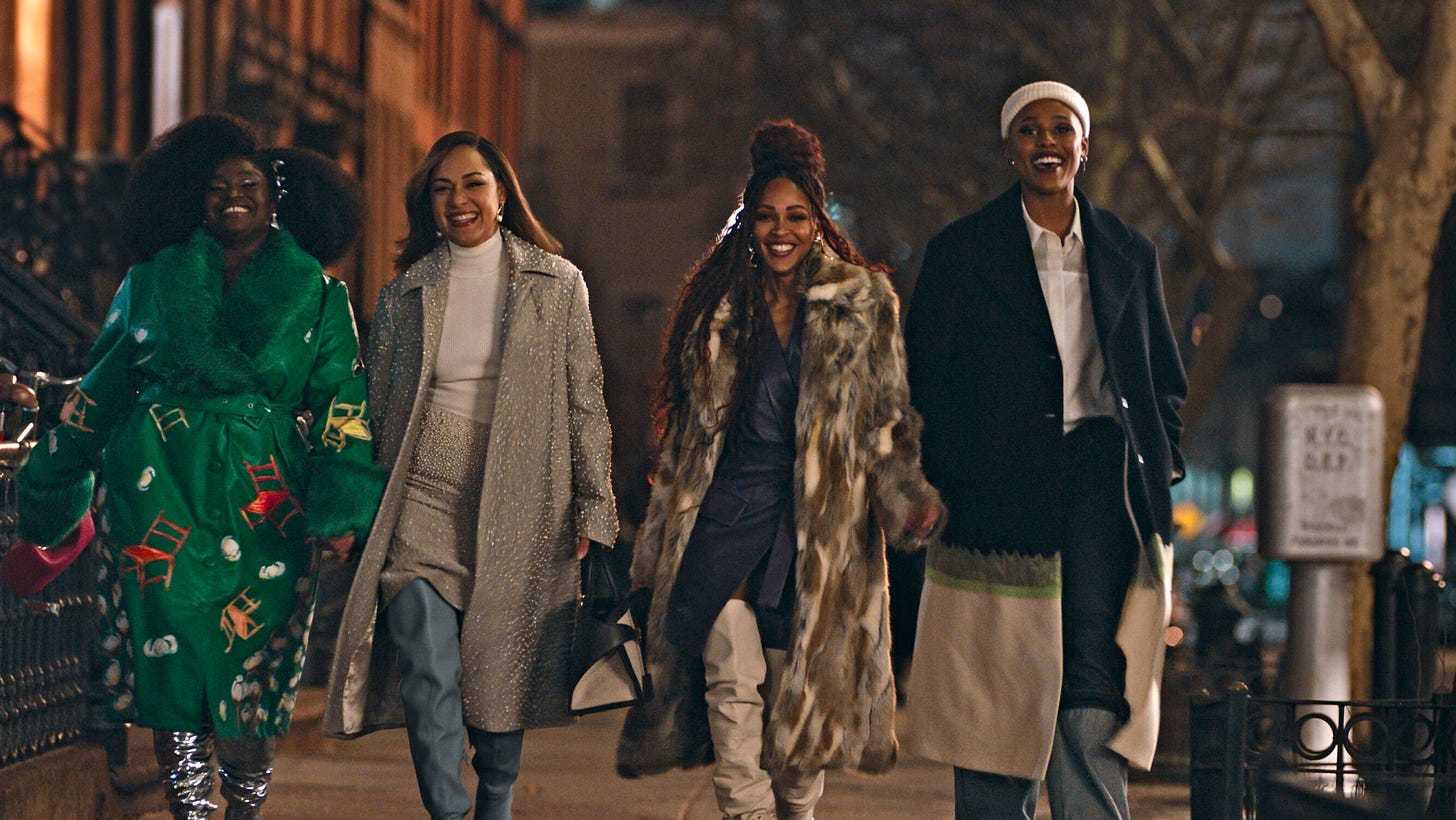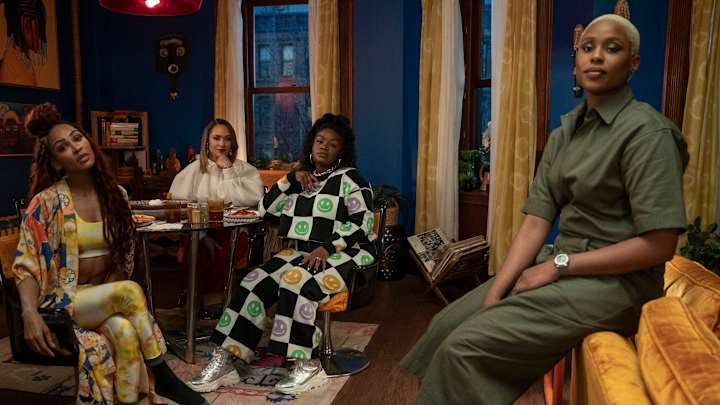Harlem Season 3 Breakdown & Insights!
Exploring ethical non-monogamy, navigating co-parenting post-separation, safeguarding personal goals in partnership and MORE!
Spoiler Alert - if you haven’t completed season 3, you should watch all six episodes before continuing!!!
The final season of Harlem has arrived, and you can stream all six episodes now on Amazon Prime!
Harlem is a comedy-drama series available on Amazon Prime following four girlfriends in New York City as they navigate family, romantic relationships, and their careers, all while supporting each other's growth. When it first premiered, many dubbed it the Black woman’s version of Sex and the City, but having rewatched Sex and the City as an adult, I would argue that Harlem offers more depth and cultural sensitivity than that series.
Moreover, I might even suggest that the characters in Harlem show more emotional maturity and competency than Carrie, Samantha, Charlotte, and Miranda ever demonstrated.
Season 3 began on Thursday, January 23rd, with the release of Episodes 1 and 2, followed by Episodes 3 and 4 a week later.
I first drafted this review after episodes 1-4 aired, focusing on the themes and insights presented up to that point. After the final two episodes aired on Thursday, February 6th, I returned to add my reflections.
Let’s Discuss!
Season 3 Breakdown and Highlights
Camille and Ian
Ep 1-4
Camille Parks, played by Meagan Good, has been a cornerstone of the show since its inception. Ian Walker, portrayed by Tyler Lepley, who is widely known from P-Valley, is also a central love interest and figure in the series. During this season, we discover that Camille and Ian are expecting their first child. This news comes after their breakup, where they decide to engage in a 'no strings attached' sexual relationship, only for Ian to begin a serious relationship with another woman. Throughout these developments, we observe two people who, though no longer romantically involved, are still working together to navigate the new territory of impending parenthood respectfully while allowing for mistakes. I have lost track of the fictional and real-life cases where men have been absent and unsupportive co-parents in comparable situations, so I genuinely appreciate this portrayal.
Is Ian meeting all of Camille's expectations as he learns to navigate this new journey? No. But is he putting forth earnest effort, open to learning, and accepting feedback from Camille along the way? Yes.
Additionally, the expenses surrounding prenatal care deserve attention. Many women are unaware of the financial implications of prenatal blood tests, ultrasounds, invasive vs non-invasive genetic testing, and the costs associated with childbirth. It’s critical to create a budget with your partner to cover these costs, especially without insurance, and I'm grateful that the show raises awareness about this essential topic.
Ep 5-6
Although Camille was hesitant at first, the baby shower segment became both meaningful and essential. What I cherished most in the concluding episodes was how Camille and Ian supported each other through the final stages of pregnancy. Ian created a cozy baby nook in their home, and they joyfully welcomed their new arrival, surrounded by family and friends.
It was also heartwarming to witness Camille and Ian reconnect romantically, as their previous reasons for separation no longer held weight. Now, they eagerly embrace parenthood and look forward to building their family together.
Tye and Eva
Tye Reynolds, another key character played by Jerrie Johnson, is the queer representative of the friend group. Her latest romantic interest this season is Eva, played by Gail Bean, also known from P-Valley.
This season, we see Tye entering a relationship with Eva that's notably different from her past "situationships." Instead of being exclusively physical, Eva acts as an accountability partner, encouraging Tye to become the best version of herself.
Meeting a partner who challenges you to confront unhealed emotional wounds and unhealthy patterns can be transformative. This kind of relationship nudges you toward your highest self, often revealing facets of you that neither you nor the world has seen before, which might be met with resistance. Yet, on the other side of that resistance lies understanding and respect, leading to personal growth and expansive opportunities.
Ep 5 & 6
I wasn’t surprised when Tye missed the first meeting with Eva's mother. Especially when concerning her past family issues and the hurried nature in which the situation was initially presented, leaving little time for her to prepare mentally and emotionally. Still, Tye should have communicated her concerns before agreeing to attend, which could have helped avoid the unfortunate situation that unfolded later that evening.
Regardless, I appreciated Tye's efforts afterward to make amends and apologize to Eva's mother, which was crucial for reconciliation. While having a perfect relationship IS NOT realistic, taking accountability and making progress, absolutely IS. I was glad to see that they managed to resolve their differences before the season ended.
Quinn and Seth
Quinn Joseph, played by Grace Byers and present since Season 1, is dating Seth played by Kofi Siriboe, widely recognized for his role in Queen Sugar. In this season, Quinn shines as she chooses to focus on herself—a beautiful development given her past struggles. When women take the initiative to prioritize their own needs, unforeseen opportunities can emerge. However, in dating, women tend to romanticize relationships, before gathering all the necessary information.
In episode 4, I see Quinn starting to prematurely idealize a relationship with a man she's just beginning to get to know, all while expectations and boundaries remain unspoken and unresolved.
Episode 4 left us with a cliffhanger, but I anticipate that upcoming episodes will explore her new romance further and push her to establish boundaries and communicate her expectations in their potentially ‘ethical non-monogamous’ partnership.
Ep 5 & 6
As predicted, Seth shared his idea of Ethical Non-Monogamy with Quinn. After meeting the possible primary partner, Quinn quickly recognized that this lifestyle was not something she felt comfortable with or preferred. Nonetheless, Seth was open and detailed about the concept. He clearly explained everything and arranged an introduction between Quinn and the potential secondary partner. While this arrangement didn't fit her notion of an ideal relationship, Seth approached it with a respectfulness that gave Quinn the space to make a choice that was truly right for her.
Angie and Michael
Shoniqua Shandai portrays Angie Wilson, while Luke Forbes plays her fiancé Michael. Angie is among the four main characters, but Michael only appeared from Season 2 onward. The lessons these characters convey in their partnership relate primarily to compromise and maintaining one's authenticity.
When planning their wedding, Angie overlooks Michael’s input, despite him handling all the financial responsibilities. A healthy marriage is rooted in ENDLESS compromise and sacrifice, starting from the engagement phase. Learning this early can ease unnecessary tensions along the way.
Additionally, when Angie discusses performing the song 'Drugs in My Booty' for a reporter, we notice some pushback from Michael regarding the seriousness of the song choice and its potential impact on her career.
It's crucial to remember the importance of safeguarding personal and professional interests within a long-term partnership. Women can easily lose sight of themselves in a relationship while trying to please their partners, which can ultimately fracture the bond as partners drift away from the very qualities that originally attracted them to one another. Protecting individual interests makes for a healthier relationship. Balance and authenticity are vital; both people should maintain their own identities while supporting each other, as this is one of the best ways to ensure a lasting and healthy marriage.
Ep 5 & 6
The most revealing moment in the final episodes occurred when Michael confessed that he was unaware of Angie’s ambition and that he felt uncertain about it. Although honest and painfully direct, it highlighted the type of relationship dynamic he preferred. This statement revealed that her ambition and strong work ethic diminished her desirability as a partner in his eyes. While this candidness may have surprised some viewers, many dominant partners with traditional gender roles share similar expectations.
Their future incompatibility became evident during her Broadway play premiere when Angie received a film role that conflicted with their wedding date, prompting Michael to present her with an ultimatum.
It was a hidden blessing that the partners discovered their incompatibility through some difficult talks before diving into marriage. This experience hopefully encourages them to engage in more sincere discussions about their expectations early in their future romantic relationships, setting a foundation for better understanding.
Final Thoughts
Season 3 of Harlem sparked engaging discussions, and I am truly thankful to the writers for weaving in significant themes such as ethical non-monogamy, navigating parenthood after separation, and safeguarding personal goals in lasting relationships. Harlem filled a void that many viewers surely appreciated, especially during these challenging times.
Shows like Harlem also take us down a nostalgic path, making us reflect on the significance of fictional friend groups of Black women. They occupy a special place in our hearts, even after the series concludes. From Waiting to Exhale to Insecure, and now Harlem, these stories serve as a reminder of how essential these bonds are to stabilizing our lives in many other areas. I only wish we had more representations and that the remarkable shows we do get, like Harlem, weren’t cut short too soon.





